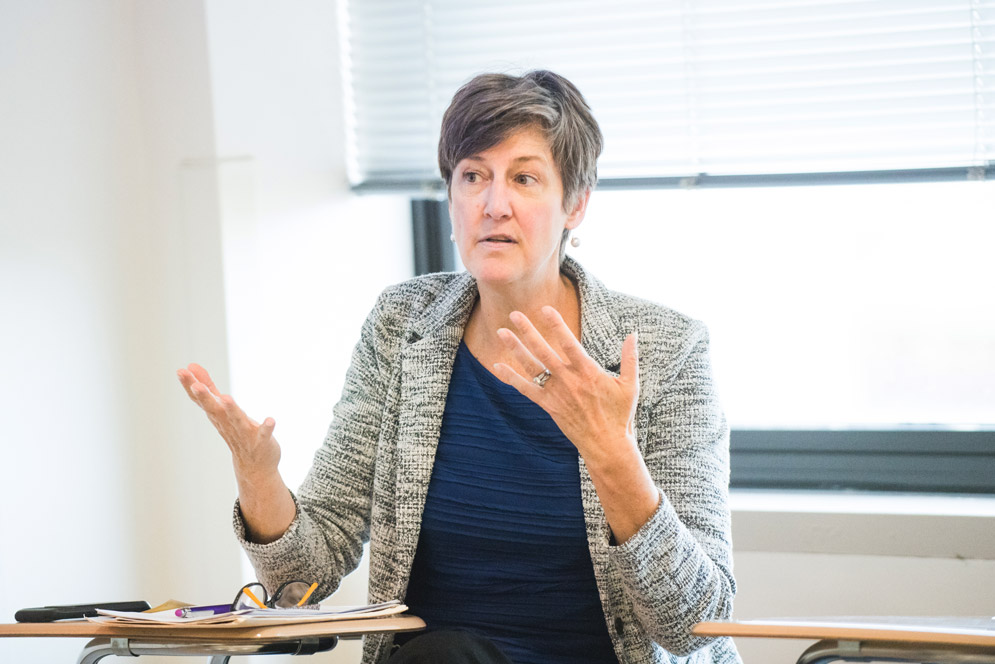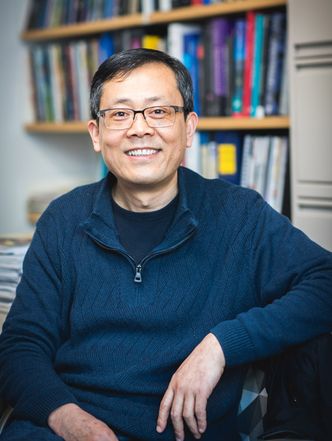Eight Charles River Campus Faculty Promoted to Full Professor
Studies include military families, neurobiology, Holocaust history, nanophotonics

Ellen DeVoe, a School of Social Work professor of clinical practice, is working with military families at Fort Hood in Texas, hoping to help young children cope with parents’ deployments. Photo by Jackie Ricciardi
One works with military families in Texas. Another studies the development of neurons in lab mice. Both hope to improve the lives of children and families—and both are among eight BU faculty members promoted to full professor on the Charles River Campus.
Ellen DeVoe, a School of Social Work professor of clinical practice, has long studied the impact of trauma on young children and their families, hoping to improve parenting practices during stressful experiences. Since 2014, she has been working with army families who have children age five or younger, trying to find ways to help them cope with separation before, during, and after a parent’s deployment.
“We try to work with the at-home parent, especially around the question of how do you keep the service-member parent present in the daily life of the child,” says DeVoe, who earned a PhD at the University of Michigan. “Some of them have a picture up at the dinner table every night, so that young child understands that dad or mom is part of their family even though they’re deployed. Or dad sends a picture, and they color it in and send it back.”
Currently she and colleagues are working with 125 army families at Fort Hood in Texas, whose service-member parents deploy to a variety of locations, including Afghanistan and South Korea. The research is funded by a $4.4 million Department of Defense grant.
“When the parent comes home, there’s a lot of renegotiation of daily routine, helping them learn to participate in the bath or the bedtime routine,” she says. “If the service member is struggling, that can be difficult. They’ve been in this command hierarchical setting, and coming home to a two-year-old and a four-year-old, there’s a level of chaos that can be difficult to get used to. And if the service member comes home with a lot of combat exposure or traumatic stress, that affects everyone in the family, so we try to help them integrate from that standpoint, too.”
DeVoe has earned national distinction in the field of trauma-related intervention research and has served on two Council of Social Work Education task forces, has spoken often at national and international conferences, and has written four book chapters and numerous journal articles.

Hengye Man, a College of Arts & Sciences professor of biology, specializes in molecular neurobiology, examining the genes and signaling molecules that control the formation of synapses between neurons in the central nervous system. Man earned an MD at Taishan Medical University in his native China. When he realized that pure research was his real love, he earned a PhD in neuroscience at the University of Toronto and was a postdoctoral fellow doing research at Johns Hopkins University, then joined BU in 2005.
Most recently, he and researchers in his Man Lab have focused on the cellular and molecular alterations underlying the pathogenesis of autism, working with the NEXMIF gene, which can lead to intellectual disabilities and autism when it is missing in human beings.
They’ve learned that knockout of this gene leads to inhibition in neuron growth and interneuronal communication and alters neuron migration in the brain. They have recently created a NEXMIF-knockout mouse line as an autism model.
“Animals without this gene showed typical autistic behaviors, including impaired social behavior, learning, and memory,” Man says. “They also had repetitive behavior, which for animals is typically grooming.”
Now, he says, the Man Lab will study the mechanism by which the presence or absence of the gene affects brain development on the molecular level, with the hope of someday identifying a treatment strategy. If they can find a particular molecular step involved in the disorder, such as an enzyme or other signal pathway, it might be possible to develop a drug to treat it.
“I have quite a few family members of people with autism sending me emails asking, ‘What’s the progress, do you have a way to treat this?’” Man says. “I have to say, ‘Sorry, we don’t have a way—yet.’”
Man is a recipient of the National Natural Science Foundation of China’s International Outstanding Young Scholar award, a Brain & Behavior Research Foundation NARSAD Young Investigator Grant, and a Dean’s Catalyst Award. He has written a book chapter and published dozens of articles in biology journals.
“We are very proud of all of these talented members of our faculty,” Jean Morrison, University provost and chief academic officer, says of DeVoe, Man, and the six other faculty who have been promoted to full professor.
“They are leading in so many important areas, from harnessing the power of light for new energy applications and reexamining the origins of neurological disorders like autism to helping families with young children overcome trauma. They are producing important new research and scholarship in the sciences and humanities, merging disciplines, and in many cases, helping to redefine their fields of study. They exemplify the best of what we hope for in Boston University faculty, and we applaud them on reaching this milestone.”
Joining Ellen DeVoe and Hengye Man as full professors are:
Emily Barman, CAS professor of sociology
Barman researches the social organization of philanthropy, drawing on numerous disciplines to understand the structures and practices of the nonprofit sector. Recognized among the leading voices in her field and a frequent presenter at international conferences, she has authored two books, Contesting Communities: The Transformation of Workplace Charity (2007), winner of the Association of Fundraising Professionals annual prize for best research, and Caring Capitalism: The Meaning and Measure of Social Value in the Market (2016), and has published more than a dozen articles in sociology journals.
Nancy Harrowitz, CAS professor of Italian
Harrowitz’s field is Italian and Jewish studies, with a focus on the history of racialism, the Holocaust, and the life and works of Primo Levi. Considered among the foremost experts in modern Italo-Jewish writing, Harrowitz has received numerous humanities grants to support her research and has published or coedited four books, most recently Primo Levi and the Identity of a Survivor (2016).
Stephen Kalberg, CAS professor of sociology
Kalberg specializes in the scholarship of German social theorist Max Weber, focusing on comparative political cultures and the contemporary challenges of civic engagement and democracy in America. He has been a past Fulbright Teaching/Research Scholar and has written 12 books, most recently The Social Thought of Max Weber (2016).
Emanuel Katz, CAS professor of physics
Katz explores theoretical particle and condensed-matter physics, using conformal field theory techniques to develop new ways of thinking about interacting fields and working to improve understanding of the physics related to large hadron collider experiments. He is a National Science Foundation CAREER Award recipient, an Alfred P. Sloan Fellow, and a recipient of a Simons Foundation Collaboration Award, and his research has received continuous support from the US Department of Energy. A frequent speaker at national and international conferences, Katz has published dozens of articles in physics journals.
Carrie Preston, CAS professor of English and women’s, gender, and sexuality studies
Preston’s areas of expertise are modernist literature, performance, and dance; feminist and queer theory; and transnational and postcolonial studies. She is director of the Kilachand Honors College and a recipient of BU’s United Methodist Scholar/Teacher of the Year Award, a Peter Paul Career Development Professorship, the CAS Wisneski Award for Excellence in Teaching, and the De la Torre Bueno Prize for writing in the field of dance studies. She has authored two books, most recently Learning to Kneel: Noh, Modernism, and Journeys in Teaching (2016).
Luca Dal Negro, College of Engineering professor of electrical and computer engineering and of materials science and engineering and CAS professor of physics
Dal Negro specializes in optics, nanophotonics, plasmonics, and the development of optical materials that advance on-chip optical sensing, light emission, energy conversion, and thin-film solar cell technology. A National Science Foundation CAREER Award recipient and a Fellow of the Optical Society of America, he serves on the editorial boards of two leading international journals in materials and photonics systems, has authored numerous book chapters and widely cited journal articles, and is supported by several major grants from the National Science Foundation, the Army Research Laboratory, and the US Air Force.

Comments & Discussion
Boston University moderates comments to facilitate an informed, substantive, civil conversation. Abusive, profane, self-promotional, misleading, incoherent or off-topic comments will be rejected. Moderators are staffed during regular business hours (EST) and can only accept comments written in English. Statistics or facts must include a citation or a link to the citation.